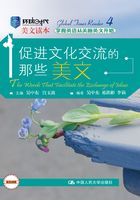
04
American Attitude—Defying Authority 美国心态——藐视权威
导读
在世界上大多数国家,人们不敢或不愿去招惹权威,更别说挑战他们了。而美国人从小就训练孩子去提问、分析、探索。由此,他们养成了一种心态:不会因为你是某一领域的权威,就无条件地相信或接受你的思想或做法。这也许解释了为什么美国拥有那么多项创造发明和革新成果。
In much of the world, authority is not challenged either out of respect or out of fear, sometimes, too, because a hierarchy of rank has been fixed for so long that people have been trained for generations never to challenge it.
of rank has been fixed for so long that people have been trained for generations never to challenge it.
在世界上大部分地方,或出于尊敬,或出于恐惧,没有人去挑战权威,有时可能是因为长久以来固定下来的长幼尊卑的秩序使得一代又一代的人养成了从不去质疑权威的习惯。
In such countries children are not expected to question their teachers in school, and brilliant young scholars or inventive industrial geniuses are hampered in technical research because they hesitate to disagree with their “superiors.” Clever researchers may be considered too young to have“any right” to present findings that contradict knowledge and wisdom of their elders.
in technical research because they hesitate to disagree with their “superiors.” Clever researchers may be considered too young to have“any right” to present findings that contradict knowledge and wisdom of their elders.
在这样的国家里,孩子不会去质问学校里的老师,而才华横溢的年轻学者或善于发明创造的实业界天才由于不愿表达与“前辈”的不同意见而在技术研究方面受到牵制。头脑灵活的研究者可能会被认为太年轻而“无权”展示其与前辈的知识和智慧相左的研究结果。
The American is trained from childhood to question, analyze and search. “Go look it up for yourself, ” a child will be told. School tasks are designed to de mand the use of a wide range of materials. An assignment to “write a paper on the world's supply of sugar” will send even a young child in search of completely unfamiliar ideas. Even in the primary grades, children are taught to use libraries, and to search for new ideas. By the time they are 14, 15, and 16, many young scholars are making original and valuable contributions in all fields of science from astrophysics to oceanography
to oceanography . Indus try is so aware of this resource that each year, through national competitions, it offers tremendous awards among teenagers in order to seek out (and later employ) the brilliant, inquiring minds which they find scattered across the country.
. Indus try is so aware of this resource that each year, through national competitions, it offers tremendous awards among teenagers in order to seek out (and later employ) the brilliant, inquiring minds which they find scattered across the country.
美国人则从小就训练孩子去提问、分析、探索。“自己去查一查”,他们总是这样对孩子说。学校设计的作业常常需要用到各种各样的材料。为了完成一项“写一篇关于全球食糖供应的论文”的任务,一个小孩子可能会去搜寻那些完全陌生的概念。即使是小学生也要学习利用图书馆去搜索一些新知识。到他们14岁、15岁或16岁的时候,许多年轻学者已经能在从天体物理学到海洋学的各科学领域做出有独创性并有价值的贡献了。实业界深深了解这个未开发的资源,每年都搞全国性竞赛,给青少年提供巨额奖金,以发现(以后雇用)散布于全国的有才华并喜欢探究的人才。
As seen by members of other nations, this emphasis on questioning and searching is bad for young people's “manners.” Foreigners often feel great “lack of respect” in our youth. It is true that many do become rude and pressing. Foreign visitors are of ten surprised and frequently annoyed to find junior staff members “daring” to challenge older ones or argue points with them; they do not always like it when these young men make detailed but often revolutionary suggestions. One's own plans, reports of analyses may be looked through in detail—perhaps even challenged—by a young person. This is not to be considered a loss of face; nor is it a sign of “no confidence.”Our whole approach to research is different. Your ideas are being looked at, not you yourself. To us the two are quite separate. This is the way our mind works. We are seeking facts; we are not challenging you as a person. So, too, even in social conversation you will find that people often argue, pick an idea apart, ask for your sources or challenge your conclusions. They do not mean to be rude; they are keenly interested and merely trying to explore the idea in greater depth.
在其他国家的人看来,强调提问和探索对青年人的“举止”非常不利。外国人常感到我们的年轻人“不够恭敬”。的确有些年轻人行为鲁莽,咄咄逼人。国外访客发现年轻职员“敢于”向年长者提出异议并与之争论问题时,总是感到震惊和不悦。当这些年轻人逐条提出完全革新化的建议时,他们并不总能欣然接受。个人的计划、分析报告可能会被仔细查阅,也许还会被质疑,而查阅和质疑者却是一个晚辈。这不应被看作有失颜面,也不是对你“缺乏信心”的标志。我们的整个研究方法是不同的。考查的是你的思想,而非你自身。对我们而言,两者是完全分开的。这就是我们头脑运作的方式。我们在探究事实,不是在向你个人发出挑战。因此,即便在社交谈话时,你也会发现人们常常争论剖析一个想法,问问出处,质疑结论。他们并非故意无礼,而只是颇感兴趣,想要进一步地探究这个想法罢了。
Cloze 选词填空
foreigners when by challenge but surprised on true
As seen 1 members of other nations, this emphasis 2 questioning and searching is bad for young people's “manners.” 3 often feel great “lack of respect” in our youth. It is 4 that many do become rude and pressing. Foreign visitors are of ten 5 and frequently annoyed to find junior staff members “daring”to 6 older ones or argue points with them; they do not always like it 7 these young men make detailed 8 often revolutionary suggestions.
Key
1. by 2. on 3. Foreigners 4. true 5. surprised 6. challenge
7. when 8. but
Translation Practices 翻译练习
The American is trained from childhood to question and analyze, search. “Go look it up for yourself, ” a child will be told. School tasks are designed to demand the use of a wide range of materials. An assignment to “write a paper on the world's supply of sugar” will send even a young child in search of completely unfamiliar ideas. Even in the primary grades, children are taught to use libraries, and to search for new ideas.
____________________________________________________________________________________________________________________________________________
Key
美国人则从小就训练孩子去提问、分析、探索。“自己去查一查”,他们总是这样对孩子说。学校设计的作业常常需要用到各种各样的材料。为了完成一项“写一篇关于全球食糖供应的论文”的任务,一个小孩子可能会去搜寻那些完全陌生的概念。即使是小学生也要学习利用图书馆去搜索一些新知识。